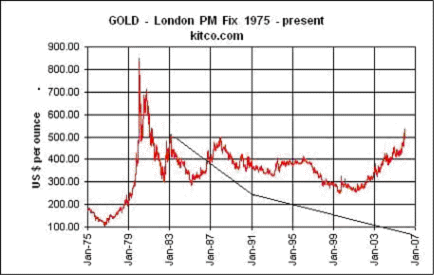JHill said:
Over the long run, you're better off in stocks. I can be buying stocks on a discount right now, whereas gold is at a premium. When the economy recovers, gold values will plummet and the stock market will rise. I make more money by being in the market.
I'm sorry if I made myself unclear. I wasn't wondering what the best investment strategy is (that was later in my post), I was wondering (or rather seeking confirmation) that gold (or any other commodity) has intrinsic value and so does not suffer from being devalued like currencies do. To be more precise: Governments artificially increases the money supply which causes the currency to be worth less. This does not happen to commodities. For this reason, I can hold onto gold and its value will not decrease (assuming supply&demand remains the same) whereas a currency will decrease in value. E.g. I buy a gold bar in year 0 for 1$. In 10 years there has been 100% inflation. I can now sell my gold bar and get 2$ and have the same purchasing power as in year 0. But if I just held on to my dollar, I would now have half the purchasing power I did in year 0.
I posed this question because my econ prof said I'd be just as well off stuffing my dollars in my mattress for saving as I would if I bought gold. Surely he must be mistaken, because that makes no sense.
Gold doesn't protect against inflation any more than any other commodity does.
I'm just using gold as an example because it is traditionally used as a store of value, insert whatever good you wish. But do goods suffer inflation? Goods are subject to supply and demand, currencies are subject to inflation.
I know you'll say it is the same thing, currencies are subject to supply and demand too. I know, but there is a difference. If there is an increase in the supply of aluminum, aluminum will be worth less (scarcity), but there is now more actual wealth in the society because there is more aluminum. However, if the money supply increases because government wants to pay for its great endeavors, there isn't more real wealth in society.
I don't understand what your graph is suppose to show, you're comparing gold with gold. If you wanted to show that gold loses its value like currencies do, you'd have to have a graph showing the purchasing power of gold vs the purchasing power of the dollar from year X to year Y, using the CPI or something. I would guess that you'd find that gold has decreased slightly and the dollar has decreased greatly in value. I'm guessing so because more gold is being mined which means greater suppl;, and even though the population is increasing, it is mostly increasing in poor countries, so the demand for the luxury good gold will not increase by as much as the supply. But I could be wrong, we all know there are tons of factors in economics - and we can only make educated guesses.
Not against investing your long-term savings into a market index fund no. Gold, or commodities in general, are a reasonable purchase for someone with a large portfolio who needs to sufficiently diversify and hedge against risk. For the average person, investing in gold doesn't make sense.
Thanks, I probably won't buy gold now. But I guess if you are incredibly risk averse, gold would still be a better option, markets can crumble, governments can even get toppled by some conflict, war or civil war. In which case your stocks and money will be worthless, but your gold won't.
Thanks






